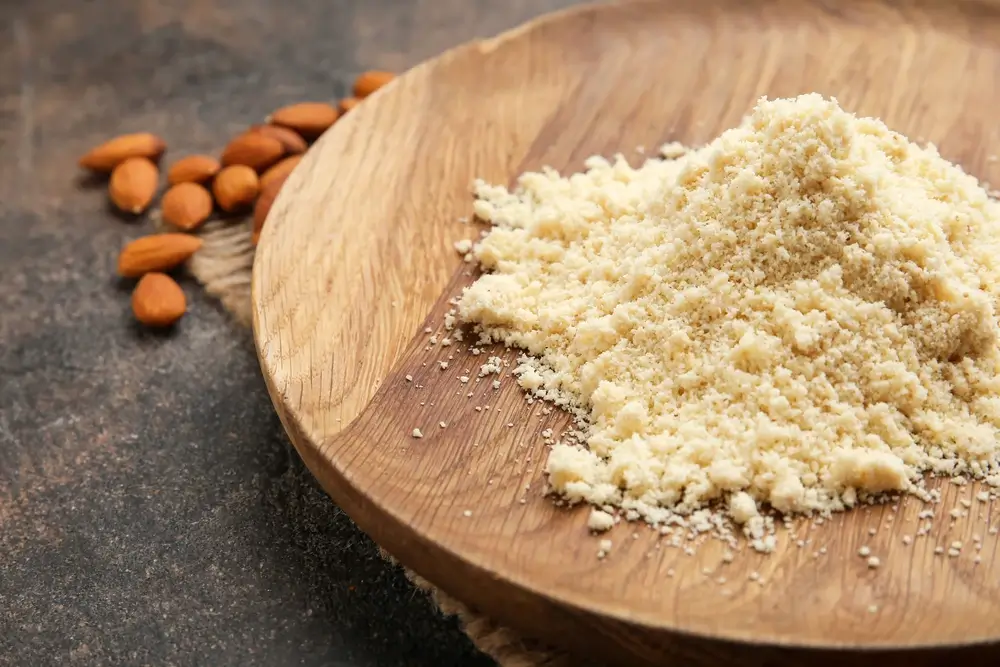
Almond flour has become popular worldwide because of its richness of protein, fiber, vitamins, and magnesium. Its gluten-free property has become a blessing for people who can’t have regular white flour.
However, it is a relatively new ingredient, and many people need to learn how to store it. So, they leave it somewhere and later wonder, “Does almond flour go bad? How long does it last?”
We have everything answered in this article on vegan flour. For your convenience, we also added storage tips and spoilage signs. So, let’s jump in!
Does Almond Flour Expire and Go Bad?
Almond flour is excellent for making pancakes, cookies, pizza, bread, etc. There are also other substitutes for almond flour, but this is truly versatile. You can use it for almost anything that requires white flour. But just like every other food, it will expire.
Every packet of almond flour will have a label with the expiry date on it, and even though it will mention a specific date, some almond flour can last you longer.
However, if you keep your almond flour properly or use it all by a specific time, the flour will stay fresh and will not give you the same outcome as before.
So, to answer your question, yes, almond flour expires and will go bad eventually.
How To Tell Your Almond Flour Has Gone Bad?
Did you know the more nutrients flour has, the more probability it has of spoiling? It is the case for almond flour, which is rich in nutrients.
Almond flour can easily go bad; you should know the spoilage signs to stop using it. You must recognize the signs early to avoid getting sick by eating bad almond flour.
So, here are the signs of spoilage that you should be looking for in your almond flour if you last used it a while ago.
1. Color Change
Almond flour is made from blanched almonds, which are ivory-white in hue. But not every almond flour will have the same color as an almond meal, which can have a brownish hue. However, if your almond flour doesn’t have the same color as before, it is a sign that it is no longer suitable for use. So, discard it immediately.
2. Smells Funny
If you have used almond flour, you know it has a sweet, nutty smell that reminds us of fresh almonds. Even though almonds are powder, the scent remains in the flour. So, take a good whiff of the earthy- and nutty-smelling almond flour before adding it to anything. If you get an old wood-type smell, it is time to throw your almond flour.
3. Clumps
As you know, almonds have oil in them, and when they are made into flour, the plant-based oil remains. This quality can make almond flour prone to clumping when a liquid goes into it. So, if your porous and velvety almond flour has water, be sure it will clump and create bacterial growth. Usually, very old almond flour shows this sign of spoilage. However, if you see anything like it, you can strain and dry your flour before it gets contaminated.
4. Mold Growth
If you have kept your almond flour in a humid area, molds can quickly grow. Even throwing out these greenish-blue molds won’t save the flour, as the mold roots will stay in it. So, if you find mold growing, get a new bag of almond flour.
5. Worm Infestation
Almond Flour is prone to worms because of having high nutrient quantity. Worms love to snack on these nutrients with their whole family. We hope you understand what it means. It means your almond flour is now worm food and is no longer safe for consumption.
How Long Does Almond Flour Last?
Like other nut flour (coconut flour or peanut flour), almond flour can last very long, but it depends on how it is stored. If you have an unopened packet of almond flour, you can easily keep it in your pantry or kitchen cabinet for five months. However, if you open your almond flour bag, it will only last till its expiry date.
To give you accurate information on the shelf life of almond flour, we have made a chart.
| Type of Almond Flour | Pantry | Fridge | Freezer |
|---|---|---|---|
| Unopened and Store-bought | 3 to 5 months | 5 to 8 months | 1 to 2 years |
| Opened and Store-bought | Best Before Expiry Date | 3 to 5 months | 5 to 10 months |
| Homemade Almond Flour | 7 to 8 weeks | 2 to 4 months | 4 to 7 months |
How To Store Almond Flour Properly?
You must store your almond flour properly to avoid contamination and bacterial growth. It is easy to store almond flour; if you need help, we have your back. Follow the instructions below; hopefully, you will have safe almond flour for longer.

1. Pantry
You can store your opened or unopened almond flour in the pantry. Make sure the place is dry, clean, and away from direct heat or sunlight. If your bag of almond flour doesn’t have a sealing option, you can pour it out into a glass jar or a food-safe plastic container to seal it properly. Please ensure the containers don’t have any water or other dirt.
2. Refrigerator
Have you ever noticed that your almond flour label says to keep it in the fridge for the best shelf life? If you haven’t, now you know! The refrigerator provides a clean, dry, and cold environment, keeping your flour fresh and last longer. It also prevents worm infestation or contamination.
So, keep your almond flour in the refrigerator immediately after use. However, pouring it into a glass jar or a plastic bag is better to avoid cross-contamination.
3. Freezer
No one considers freezing their almond flour or even any other flour. But did you know freezing your almond flour can extend its shelf life to about a year or two? It also helps keep away any bugs, molding, or bacterial growth.
However, you will notice the texture of the flour change and become crumbly and sticky. It is normal, as almond flour contains oil in it.
You can easily get rid of the texture during the thawing process. If you are planning to keep your almond flour in the freezer, make sure to bag it in a freezer-safe bag or container. Moreover, you must thaw your flour before using it for any recipe.
What Happens If You Eat Bad Almond Flour?
If your almond flour has gone rancid, it is not safe to eat anymore. It has lost its nutrients and has formed bacteria. Moreover, if you have made something without knowing your flour has gone bad, it will affect your health.
You may show symptoms of food poisoning, like nausea, vomiting, and diarrhea. Too bad almond flour consumption can also lead to gastritis and abdominal pains. So, it is better to look for spoilage signs before and if you experience such symptoms, visit a doctor ASAP.
You may also like: Does Condensed Milk Go Bad
Frequently Asked Questions
Can You Use Expired Almond Flour?
Yes, you can unless it has gone bad. So check beforehand!
Can You Get Sick from Expired Almond Flour?
Yes, expired and bad almond flour can get you very sick. So, look for spoilage signs before use.
What is the Difference Between Almond Flour and Almond Meal?
Almond flour is made with peeled and blanched almonds, whereas an almond meal is made with the skin on the almonds.
Conclusion
If you are a vegan or want a gluten-free option for regular flour, almond flour is your best bet. It has a nice rich flavor with plenty of nutrients. However, due to having a high level of natural oil, it needs to be stored properly. That is why we got all the details about almond flour in this article. Now that you know everything. Go enjoy your almond flour cookies!

Eva M. Smith is the owner of this website. She is a 4 year old mother of two kids and a professional chef. Eva loves to cook for her family, but being a working mom has a lot of challenges. From squeezing in time to do the groceries to make three meals for the day. Eva knows how challenging cooking can be without a kitchen game plan.
That’s why she perfected techniques of preserving staple ingredients and several foods so that you have something pre-cooked or pre-baked to use for an array of meals. And they do not come short in flavor! And she does not want to sacrifice flavor with convenience. That’s why she is the best person to ask.
